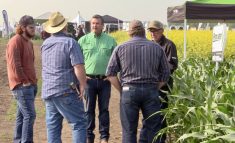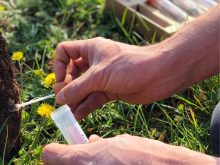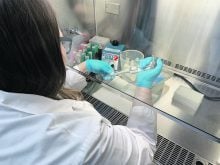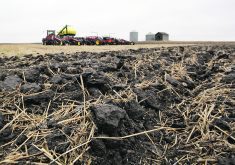Most companies that marketing crop enhancement biologicals promote the fact that their products are very narrowly focused. But one company takes the opposite approach, fostering a broad biological band of bugs.
Overton Environmental is a Winnipeg company that provides crops with a concoction of 70,000 bacteria, 30,000 fungi plus protozoa. They call it EcoTea.
Third-party analysis of its mixture was conducted by Texas A & M University, according to Overton director of operations Ken Sabatier.
He explained that greater bio-diversity in their EcoTea creates a plant environment that more closely mimics nature.
Read Also

Farmers asked to keep an eye out for space junk
Farmers and landowners east of Saskatoon are asked to watch for possible debris in their fields after the re-entry of a satellite in late September.
The basic EcoTea mix is used as a seed treatment, in-row soil, as a foliar application and in residue management. He said EcoTea is based on ecological engineering.
“We start with our 2,000-pound worm farm. Worms act as bio-reactors that generate specific beneficial biological species.
“We have three ecologically engineered composts that work to create our biology. From that we derive our products for on-seed, in-furrow, foliar application and residue management,” said Sabatier.
The automatic assumption is that any product that begins in a worm farm would only be suitable for high-value low-acre horticulture crops. Sabatier said that would be a wrong assumption.
In 2018, EcoTea was applied to 25,000 prairie acres. This year EcoTea is being applied to 700,000 acres of prairie farmland. He added that it all starts in the worm farm.
“The difference between EcoTea and other biologicals is we don’t aim at one particular crop. The same formula goes on potatoes, canola, wheat, peas, alfalfa, anything we grow on the Prairies.”
He said Overton builds an immense biological consortium. Everything it develops is sent to Texas A & M where every biological in the consortium is tagged. EcoTea works on a variety of plants because of the biodiversity in that consortium. The crop in the field will pick which biologicals in the bundle they like.
Sabatier said other biologicals on the market are excellent in their own right, but they’re customized to work only on a selected crop.
“Each gram of soil contains a million species, and they all inter-relate. They help each other and they help the crop. The biodiversity in the product has something to offer for all plants.”
For the past three years, Overton has conducted trials at the Paterson Grain Research facility north of Winnipeg, New Era research at Swan River and Fairview College in the Peace River region.
In Saskatchewan, Overton Environmental just inked a deal with Glacier FarmMedia, which also owns The Western Producer.
Overton Environmental announced a three-year demonstration project at the Glacier FarmMedia Discovery Farm at Langham, Sask. The Soil Health Discovery Project delves into diverse microbial seed, foliar and soil applications with bio-stimulants, cover crops, tillage practices, fertilizer and crop protection applications and rotational practices.
“We have a 10-acre site at the Discovery Farm. We’re doing six different crop treatments or farm systems. We have the control patch at one end, which is totally conventional farming. No EcoTea, no biologicals, just standard fertility and crop protection practices.
“At the other end, the far end of the spectrum, we EcoTea, seed dressing, in-furrow, foliar, cover crops and intercropping. Residue management will be applied later. We move incrementally from conventional to full biological. We’ll be looking at impact on the soil from year after year of the different management practices.”
Sabatier said farmers question whether they could make money using these practices. He said over the next three years, Overton Environmental will put its money where its mouth is, as the six trials come under farmer scrutiny at the Discovery Farm.


















